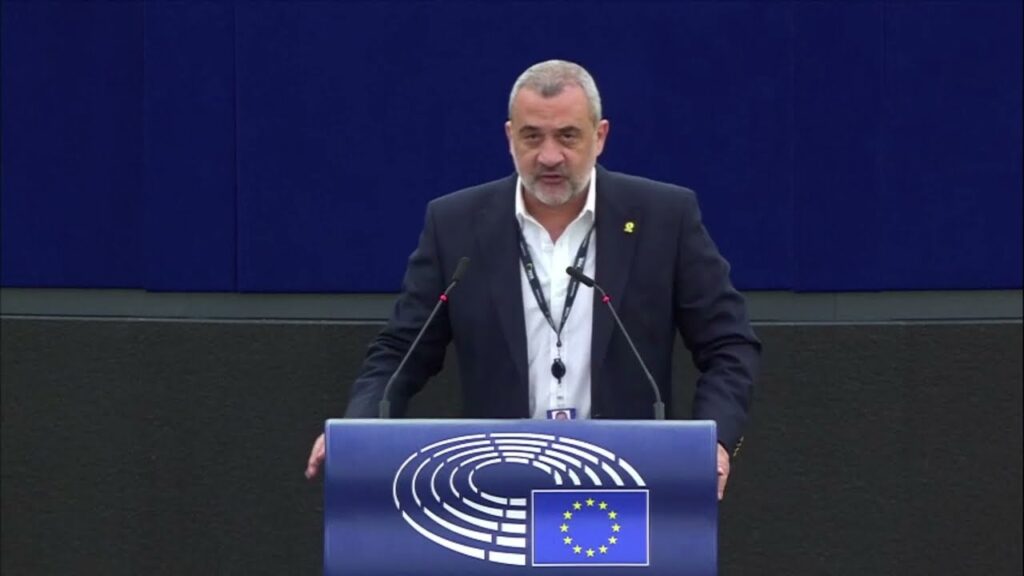Cypriot Member of the European Parliament Loucas Fourlas on Monday night launched a scathing attack on the European Union’s “hypocrisy” on the Cyprus problem.
Addressing a European Parliament session which focused on the Cyprus problem, Fourlas, who belongs to Disy, said, “the European Union’s stance on the Cyprus problem is a monument to hypocrisy.”
“Europe shows every day that it applies double standards and turns a blind eye to the ongoing Turkish occupation,” he said.
He added, “Europe has failed to live up to its history, to protect its own borders, and to protect its members. Solidarity is not a slogan, it is an action. 41 years is too long, it is time for this hypocrisy to end,” he said, referring to the 41 years since the north unilaterally declared independence in 1983.
Fellow Disy MEP Hichalis Hadejipantela was much of the same opinion, asking, “why is the violation of international law in Ukraine causing a reaction while there is silence about Cyprus? Why have our displaced people not received compensation from European funds?”
Independent MEP Fidias Panayiotou told the European Parliament that “both communities in Cyprus made mistakes which led us to division”, and added that “95 per cent of the solution to the Cyprus problem has been agreed”, but that negotiations have stalled.
The MEPs’ interventions came after outgoing European Commission Vice President for protecting the European way of life Margaritis Schinas had addressed the European Parliament on the matter.
He had said that “those who are still saying that some kind of settlement can be reached through two states have probably not spoken to anyone in Europe.
“Whoever they speak to in Europe, they will find that this has no basis anywhere, neither politically, not in the community, nor economically, nor legally.”
To this end, he said the European Commission’s position on the matter is “clear and consistent”.
“We recognise the Republic of Cyprus as the sole legitimate government of Cyprus and condemn any violation of its territorial integrity,” he said, adding that the European Union has “repeatedly expressed its solidarity to the Republic of Cyprus” and “remains fully committed to a comprehensive settlement”.
Such a settlement, he said, “must be based on the United Nations framework and must be based on a bizonal, bicommunal federation with political equality, based on the founding values of the EU.”
He went on to describe efforts to resolve the Cyprus problem as a “key issue for the EU”, and said the commission “stands ready to play its role in supporting the UN-led process for the reunification of Cyprus at all stages and with all appropriate measures at our disposal”.
Delving into specifics, he pointed out the EU’s aid programme for the Turkish Cypriot community, to which €727 million of funding has been allocated since 2006. He also said the commission is “monitoring the implementation of the Green Line regulation”, which allows for a limited amount of trade between the north and the European single market.
He added that the EU has “supported the work” of UN Secretary-General Antonio Guterres’ personal envoy Maria Angela Holguin when she was on the island, and urged the leaders of both communities to “build on the discussions” held at the informal dinner they attended with Guterres last month.
With this in mind, he said the EU is “ready” to work to bring the two communities closer together, including facilitating the opening of new crossing points and to help in efforts to “create conditions conducive to the resumption of talks”.
“It is clear that we need a fair, comprehensive and sustainable settlement in Cyprus as soon as possible. Such a settlement would be very beneficial for Cyprus and its citizens, as well as for security and stability in the Eastern Mediterranean,” he added.
He then closed his speech by saying he had protested in 1983 in Thessaloniki against the north’s unilateral declaration of independence, and added that, “41 years later, I have the honour of denouncing it officially in the name of Europe” at his last address to the European Parliament before the end of his term in the commission.
“The Turks should take some time to think about what they have achieved with this decision. They have achieved the ratification of their isolation, and, indeed on a global level, the ratification of an illegal act which had already begun in 1974 with the invasion,” he said.
“Cyprus is now an integral member of the EU and the Eurozone. It is powerful, it is at the heart of European and international developments in a geopolitically sensitive region. We want Cyprus to one day be a reunited state based on what Europe represents.”






Click here to change your cookie preferences